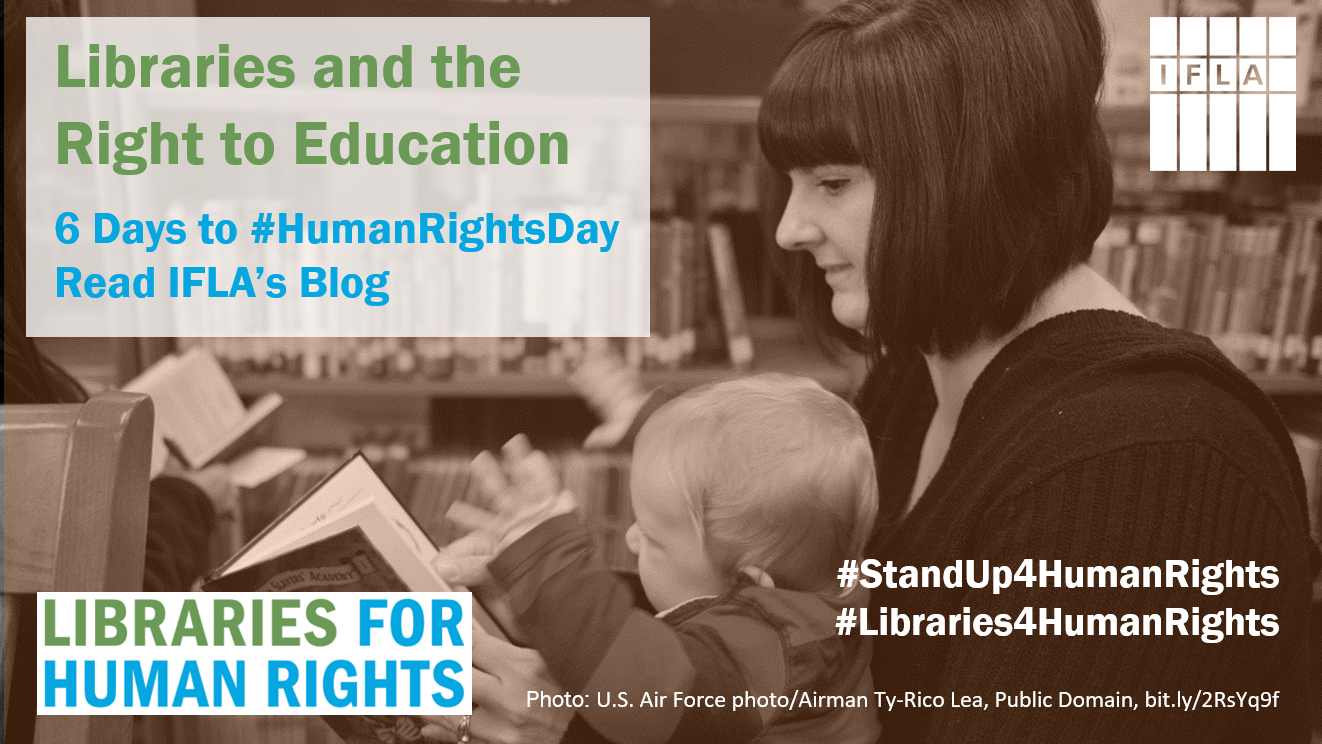
The second in our series of daily blogs leading up to the 70th anniversary of the Universal Declaration of Human Rights focuses on education. This is also the subject of a major global conference – the Global Education Meeting – taking place in Brussels on 3-5 December.
It underlines the vital and complementary role that libraries play to schools and other formal education institutions in ensuring that everyone has the possibility to learn and improve their life.
The right to education features in Article 26 of the Universal Declaration of Human Rights. It is a key enabling right, one that should give everyone the possibility to play a full part in society in the future. This is borne out by the evidence – some of the most spectacular stories of successful development in the last century have been based on investment in teaching and learning.
Yet when we discuss education, it is easy to focus on schools and universities – ‘formal education’. Indeed, many people associate learning with sitting in a classroom or lecture hall, and absorbing knowledge.
Of course, many libraries are based within schools and universities, providing students and teachers with materials and skilled support. They can even be the heart of their institutions, as is the case for some school libraries.
However, learning is much broader than this. And it needs to be. The world we live in, and the jobs we do, are evolve and become very different from those for which schools prepared us. Formal education can offer a valuable starting point, but it cannot be enough.
This is where the world’s 350 000 public libraries can come in. As was recognised in the original UNESCO Public Library Manifesto in 1949, libraries are ‘a living force for popular education’.
Many of the countries which do best in terms of formal education also invest heavily in their libraries, such as Finland and South Korea, in order to promote the right to education throughout life.
This is just as true today as almost 70 years ago. This blog looks at two ways in which libraries complement formal education.
Helping Young Learners in the Community
In many countries, libraries have a strong focus on supporting young learners. They are part of the ecosystem that ensures that children have access to books from a young age, especially when parents are not able to buy books themselves.
There are many examples, for example those run through Boekstart in the Netherlands, which provides valuable support to parents – and a complement to schools – in developing early years literacy.
As children grow, they offer a different environment – quieter often than school or home – which for some at least can make a real difference to their chances of success.
Libraries can also fill in gaps where schools are not able to offer the resources – or spaces – for young learners. Many of the projects run by EIFL’s Public Library Innovation Programme focus on giving young people access to tools, materials, and support they may not get elsewhere.
Libraries can also provide skills, for example media literacy or coding clubs, which help children grow, develop, and seize opportunities.
As set out in an IFLA article for World Teachers Day, librarians and teachers are natural partners.
Education Throughout Life
Of course education does not stop at any particular age. As highlighted in the introduction, changing technologies and changing jobs mean that people need to continue to learn.
Libraries can provide a vital gateway in this respect. Many offer basic education about how to make best use of the internet, for example to access eGovernment services or look for a job.
Some provide more advanced course in coding for example, or programmes aimed at personal fulfilment, such as creative writing or local history.
They can be attractive – and effective – as venues for learning precisely because they are public buildings, but are not as intimidating as formal education institutions.
They are particularly important for refugees, the focus of this year’s Global Education Meeting. For people arriving in a new country, at whatever age, there is always a need to learn, be it language, skills, or simply how the system works.
Libraries across host countries have looked to reach out, providing specific resources and support, especially around languages. And in refugee camps, actors such as Libraries Without Border are bringing these benefits to people who might otherwise struggle to carry on learning.
If the right to education is to be a reality throughout life, the need for libraries is clear. Libraries need to be a core part of education, training and lifelong learning strategies, engaged in conversations, and supported accordingly.
The right to education has really created huge impacts on the inclusiveness of gender mainstreaming in literacy activity. Now many women and girls go to school in most countries and communities unlike when female gender was relegated to taking care of house chores only. Even the children in rural communities are being encouraged and supported fully with wide varieties of reading and learning experiences. Yes! Everyone has rights to education. I must confess that the right to education paved way for my parents to allow me go to school. It has added value and I extend the rights to every community by advocating for this best practice. I hail this 70th Anniversary of Declaration of Human Rights. The anniversary is worth all the voices being raised and accolades being poured.